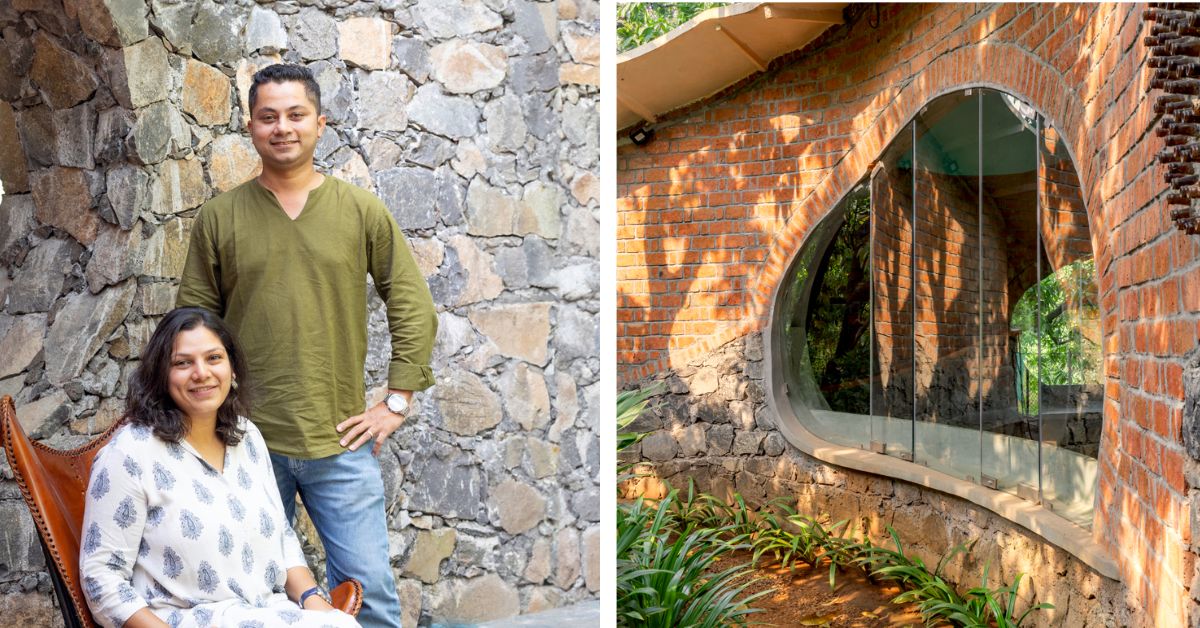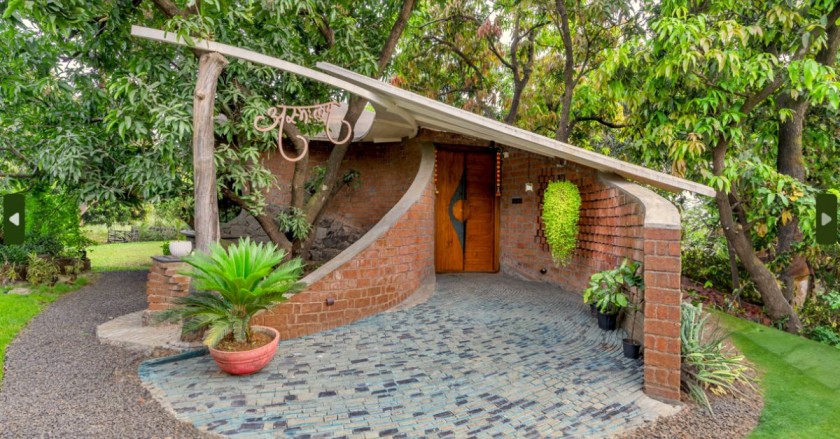When Ajay Gharat decided to build a home for himself, one thing he was sure about was that he wanted a “home which was in sync with nature”. A second home, tucked in nature, for him and his wife and kids, he wanted a space where they could run freely and feel close to nature.
“I am an Ayurvedic doctor and have built my career around nature. So when it came to designing a home, I was sure that nature would play an integral part in it,” he shares in a conversation with The Better India.
While he was determined to make his home a natural paradise, what he needed was an architect whose thoughts aligned with his. He went online and stumbled upon Mumbai-based architects, Shriya Parasrampuria and Prashant Dupare of Blurring Boundaries.
“My philosophy and ideas matched perfectly with what the duo and their firm stood for. It took one and half years for the home to be ready,” he adds.
A natural home around mango trees
Ajay had a piece of land in Pen, Raigad that he wanted to convert into a home. When the architects saw the piece of land, its natural beauty took them aback.
“The property had a lot of greenery and five mango trees. While designing the house, we kept in mind that the mango trees should not be touched. We wanted to design a house that flowed through the land and covered the maximum area without disturbing the nature around it,” explains Prashant.
The place has an open floor plan and interconnected spaces that offer versatility and flexibility, with each space transitioning seamlessly into the next.

“Since the land that we were given was not very large, and the client also wanted a backyard where he could do some organic farming, we wanted to utilise every inch and corner of the place. The open plan of the house is such that we were able to bring in more space for the kids to run around,” adds Shriya.
A two-bedroom home with a dining, kitchen and hall area, the home is made keeping in mind the earthy tones and natural materials that Ajay requested.
Talking about the name of the house, Asmalay, Ajay explains how it came about. “Our house isn’t square or rectangular; it’s not evenly distributed, which gives it a unique rhythm. This uniqueness has three meanings,” he says.
“First, the word “Asma” means uneven, and “laya” refers to flow or rhythm, reflecting the house’s design. Second, in Marathi “Asma” means “ours” and “alai” means “house’, symbolising “our house”. Lastly, if you write it in English as “A S S M,” it represents our family: Ajay (me), Swara (my wife), Megha (our elder child), and Swaraj (our younger child). The “A A” comes from “Chakla”, tying it all together. Isn’t that sweet?” he says.
Sustainable, modern and nature-friendly
“When the architects were designing the place, I mentioned that I did not want to use cement or, at least, wanted minimal use of it,” shares Ajay.
So that is what the architects delivered.
“In this particular project, we decided to go for minimal cement and go ahead with locally-sourced bricks. This was done to minimise the carbon footprint we leave behind while constructing a building,” shares Shriya.
The home is a culmination of naturally shaped arches, beautifully carved brick walls and huge windows that blend the outdoors and indoors.
“We felt that the materiality of bricks also allowed the natural light to act as a sculpting element, creating dramatic shadows and highlighting the building’s curves and contours,” shares Shriya.
Another interesting thing about the home is that it has a unique roof. “The north-facing ferro-cement roof has been carefully designed to accommodate existing trees whose horizontal canopies provide natural shading, negating the need for air-conditioning. We as architects wanted to reduce the use of mechanical ventilation as much as possible,” says Shriya.
The idea behind using locally-sourced brick and stone was to provide a thoughtful blend of earthy colours with a unique spatial structure, including the vibrant greenery around the area.
“We intentionally left the brick exposed so that the beauty of the bricks shows,” says Prashant.
Another highlight of the property is a load-bearing glass wall along the staircase. “We asked the client to collect waste beer bottles for the structure. The idea behind the wall is to use upcycled materials in the home. The bottles were upcycled into a beautiful wall and when the sun is setting, the light passes through it, giving it an amazing glow,” explains Shriya.
In a bid to not waste any materials, the architects made furniture using the leftover materials. “The beds and benches are made of bricks and are permanent. This not only reduced waste but also gave the home a more earthy and clean look,” says Prashant.
One of the favourite elements of the house, Ajay says that it took him several visits to scrap dealers but it was worth it in the end.
“We ensured that there was no waste during the construction process too. We utilised every bit of materials that we were using. The foundation is made using stone, negating the use of steel. We have also upcycled tiles and waste marble chips for the flooring of the home,” she says.
The property is now the loving home of Ajay’s family. It took nearly 1.5 years of sketching, designing and construction to complete the house and cost around Rs 45 lakh.
“The best part about the house is that all the planning, incorporation of nature, and huge windows have made the house 3-4 degrees cooler. The area is quite hot during summers but you can feel the difference in temperature as you come inside the house,” Ajay points out.
(Edited by Padmashree Pande; All Pictures Credit: Blurring Boundaries)
If you found our stories insightful, informative, or even just enjoyable, we invite you to consider making a voluntary payment to support the work we do at The Better India. Your contribution helps us continue producing quality content that educates, inspires, and drives positive change.
Choose one of the payment options below for your contribution-
By paying for the stories you value, you directly contribute to sustaining our efforts focused on making a difference in the world. Together, let's ensure that impactful stories continue to be told and shared, enriching lives and communities alike.
Thank you for your support. Here are some frequently asked questions you might find helpful to know why you are contributing?


Check what other members are talking about -
Dear Sir,
I have one filed and published patent which is awaiting for the grant.
The key features of the patent are as follows.
1.24X7 water supply across the country and globe.
2. It do not require the conventional power supply as it works on wind energy.
3. Multiple water sources can be concted.
4. Even water scares borewells can be effectively used.
5. Complete farming land across the country and globe can be irrigated.
6. By the way we can supply 24 X 7 water supply across the country and even in any corner of the world.
7.initial investment for one structure is approximately Rs 100000/-
8. Zero maintenance costs for life time.
9. Hybrid system can also be used.
Please contact
Sidramappa Dharane
Patentee
9284385485
9284093972
9890283390
Email
dr.sidramappa@gmail.com
dr.appari@gmail.com
Note: Please respond
Even it works in heavy drought and moreover it uses all the existing resources thereby the every citizen’s and national economy will enhance.
Thanks
Dear Sir,
I have one filed and published patent which is awaiting for the grant.
The key features of the patent are as follows.
1.24X7 water supply across the country and globe.
2. It do not require the conventional power supply as it works on wind energy.
3. Multiple water sources can be concted.
4. Even water scares borewells can be effectively used.
5. Complete farming land across the country and globe can be irrigated.
6. By the way we can supply 24 X 7 water supply across the country and even in any corner of the world.
7.initial investment for one structure is approximately Rs 100000/-
8. Zero maintenance costs for life time.
9. Hybrid system can also be used.
Please contact
Sidramappa Dharane
Patentee
9284385485
9284093972
9890283390
Email
dr.sidramappa@gmail.com
dr.appari@gmail.com
Note: Please respond
Even it works in heavy drought and moreover it uses all the existing resources thereby the every citizen’s and national economy will enhance.
Thanks
Umbrella type mashroom